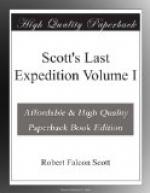Saturday, January 21.—My anxiety for the ship was not unfounded. Fearing a little trouble I went out of the hut in the middle of the night and saw at once that she was having a bad time—the ice was breaking with a northerly swell and the wind increasing, with the ship on dead lee shore; luckily the ice anchors had been put well in on the floe and some still held. Pennell was getting up steam and his men struggling to replace the anchors.
We got out the men and gave some help. At 6 steam was up, and I was right glad to see the ship back out to windward, leaving us to recover anchors and hawsers.
She stood away to the west, and almost immediately after a large berg drove in and grounded in the place she had occupied.
We spent the day measuring our provisions and fixing up clothing arrangements for our journey; a good deal of progress has been made.
In the afternoon the ship returned to the northern ice edge; the wind was still strong (about N. 30 W.) and loose ice all along the edge—our people went out with the ice anchors and I saw the ship pass west again. Then as I went out on the floe came the report that she was ashore. I ran out to the Cape with Evans and saw that the report was only too true. She looked to be firmly fixed and in a very uncomfortable position. It looked as though she had been trying to get round the Cape, and therefore I argued she must have been going a good pace as the drift was making rapidly to the south. Later Pennell told me he had been trying to look behind the berg and had been going astern some time before he struck.
My heart sank when I looked at her and I sent Evans off in the whaler to sound, recovered the ice anchors again, set the people to work, and walked disconsolately back to the Cape to watch.
Visions of the ship failing to return to New Zealand and of sixty people waiting here arose in my mind with sickening pertinacity, and the only consolation I could draw from such imaginations was the determination that the southern work should go on as before—meanwhile the least ill possible seemed to be an extensive lightening of the ship with boats as the tide was evidently high when she struck—a terribly depressing prospect.
Some three or four of us watched it gloomily from the shore whilst all was bustle on board, the men shifting cargo aft. Pennell tells me they shifted 10 tons in a very short time.
The first ray of hope came when by careful watching one could see that the ship was turning very slowly, then one saw the men running from side to side and knew that an attempt was being made to roll her off. The rolling produced a more rapid turning movement at first and then she seemed to hang again. But only for a short time; the engines had been going astern all the time and presently a slight movement became apparent. But we only knew she was getting clear when we heard cheers on board and more cheers from the whaler.




